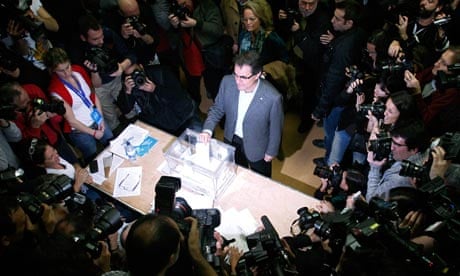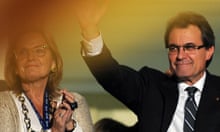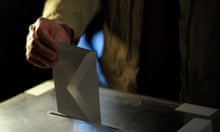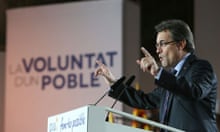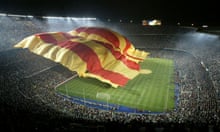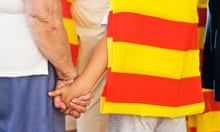The Catalan president leading the region's most determined bid for independence in decades to have fallen short of a majority in elections which he called to press for a referendum on breaking away from Spain, according to exit polls.
According to a poll by state television broadcaster TVE, Artur Mas's Convergència i Unió (CiU) party could expect to pick up between 54 and 57 seats, compared with the 68 he needed to win approval for a referendum in the 135-member Catalan parliament without settling differences with smaller parties.
CiU was on course to come out weaker than when it won 62 seats in the last elections two years ago. But Mas could take heart from predictions that the separatist Esquerra party was expected to be in second place with 20 to 23 seats. Although Esquerra, which came fourth in the last elections in 2010, has often criticised Mas's minority government, it has not ruled out an agreement.
Participation meanwhile jumped to 56.2% from 48.4% of registered voters in 2010, an early estimate by electoral authorities showed.
"Now many people have the real feeling we are opening a new era, that we are writing the book of our history with different pages," Mas said after casting his ballot on Sunday afternoon.
Unlike the Scottish referendum set for 2014 in agreement with London, the central government in Spain has pledged to block an independence vote for Catalonia by appealing to the constitutional court, which stopped the Basque country from holding a similar plebiscite in 2008.
Apart from opposition in Madrid, one of Mas's biggest difficulties is uncertainty over whether a newly independent Catalonia could remain within the European Union and the euro currency.
The European commission president, José Manuel Barroso, said in Spain last weekend that EU treaties required breakaway states to join the queue for membership.
Catalonia has its own distinct language and culture, and many Catalans think they would be better off without Spain, because some estimates show they pay more in tax than they get back from Madrid. In September, 1.5 million people flocked to an independence rally in Catalonia, which prompted Mas to call for early elections and a referendum.
In 1934, the Spanish army put down an independence revolt led by the then Catalan leader, Lluís Companys, which added to simmering tension before the 1936-39 civil war. The dictator Francisco Franco had Companys shot in 1940 and suppressed all regional aspirations for decades, but after his death Spain adopted a democratic constitution in 1978 giving considerable autonomy to all 17 of the country's regions, including Catalonia.
A recent survey by the Catalan government-funded research group CEO estimated that 57% of Catalans would vote to split from Spain. However, a Sigma Dos poll for the Guardian on Thursday showed that many Catalans would be reluctant to part with the Spanish language, passports or Lionel Messi and his Barça teammates playing football in its Primera Liga.
Spanish business leaders – many of them Catalans – have said independence would have dire consequences for Catalonia, which would lose its main market, and for Spain, which relies on the region for almost one-fifth of its economic output.
José Manuel Lara, head of the Barcelona-based publishing group Planeta, threatened to move what is the world's sixth-largest publisher away from Catalonia if the region secedes from Spain.
"There is no publishing business that has its headquarters in a foreign country, or one that speaks another language," Lara said in September. For the central government in Madrid, moves towards Catalan independence could unsettle financial markets as Spain struggles to convince its European partners that it can borrow money at affordable rates and thus avoid a bailout.
"There was no point holding elections when the priority should have been fighting the crisis," the Spanish prime minister, Mariano Rajoy, said after the EU summit in Brussels on Friday.
Falling to the third place second-largest party in the Catalan parliament, the Socialists have voiced frustration that high unemployment and unpopular spending cuts have not been prominent in campaigning, although across Spain they have sparked massive street protests and, on 14 November, the country's second general strike this year.
